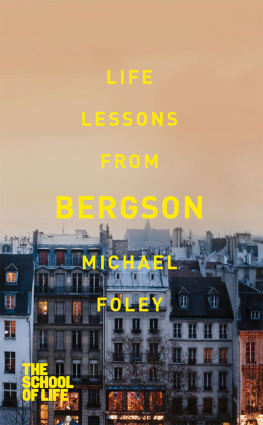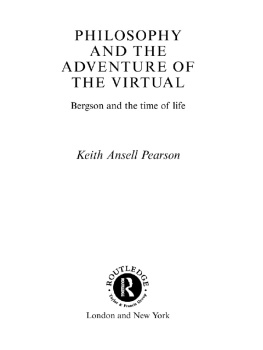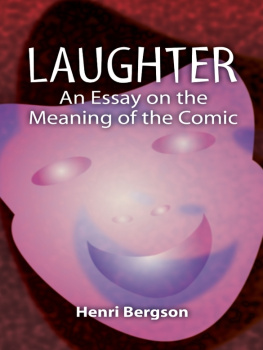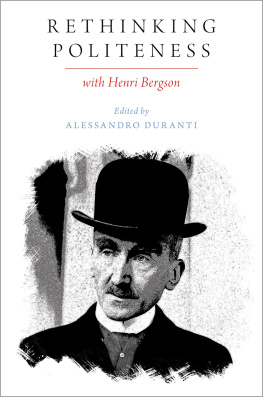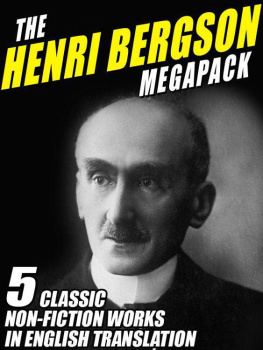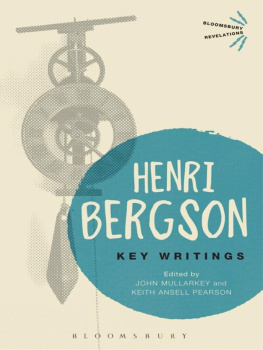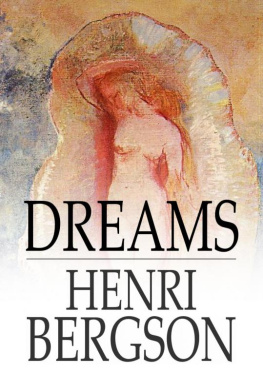Bergson Henri - Laughter An Essay on the Meaning of the Comic
Here you can read online Bergson Henri - Laughter An Essay on the Meaning of the Comic full text of the book (entire story) in english for free. Download pdf and epub, get meaning, cover and reviews about this ebook. genre: Science. Description of the work, (preface) as well as reviews are available. Best literature library LitArk.com created for fans of good reading and offers a wide selection of genres:
Romance novel
Science fiction
Adventure
Detective
Science
History
Home and family
Prose
Art
Politics
Computer
Non-fiction
Religion
Business
Children
Humor
Choose a favorite category and find really read worthwhile books. Enjoy immersion in the world of imagination, feel the emotions of the characters or learn something new for yourself, make an fascinating discovery.
- Book:Laughter An Essay on the Meaning of the Comic
- Author:
- Genre:
- Rating:4 / 5
- Favourites:Add to favourites
- Your mark:
- 80
- 1
- 2
- 3
- 4
- 5
Laughter An Essay on the Meaning of the Comic: summary, description and annotation
We offer to read an annotation, description, summary or preface (depends on what the author of the book "Laughter An Essay on the Meaning of the Comic" wrote himself). If you haven't found the necessary information about the book — write in the comments, we will try to find it.
Laughter An Essay on the Meaning of the Comic — read online for free the complete book (whole text) full work
Below is the text of the book, divided by pages. System saving the place of the last page read, allows you to conveniently read the book "Laughter An Essay on the Meaning of the Comic" online for free, without having to search again every time where you left off. Put a bookmark, and you can go to the page where you finished reading at any time.
Font size:
Interval:
Bookmark:
The Project Gutenberg EBook of Laughter: An Essay on the Meaning of the
Comic, by Henri Bergson
This eBook is for the use of anyone anywhere at no cost and with
almost no restrictions whatsoever. You may copy it, give it away or
re-use it under the terms of the Project Gutenberg License included
with this eBook or online at www.gutenberg.net
Title: Laughter: An Essay on the Meaning of the Comic
Author: Henri Bergson
Posting Date: July 26, 2009 [EBook #4352]
Release Date: August, 2003
First Posted: January 14, 2002
Language: English
*** START OF THIS PROJECT GUTENBERG EBOOK LAUGHTER: AN ESSAY ***
Produced by Steve Harris, Charles Franks and the Online
Distributed Proofreading Team. HTML version by Al Haines.
AND FRED ROTHWELL B.A. (LONDON)
This work, by Professor Bergson, has been revised in detail by the author himself, and the present translation is the only authorised one. For this ungrudging labour of revision, for the thoroughness with which it has been carried out, and for personal sympathy in many a difficulty of word and phrase, we desire to offer our grateful acknowledgment to Professor Bergson. It may be pointed out that the essay on Laughter originally appeared in a series of three articles in one of the leading magazines in France, the Revue de Paris. This will account for the relatively simple form of the work and the comparative absence of technical terms. It will also explain why the author has confined himself to exposing and illustrating his novel theory of the comic without entering into a detailed discussion of other explanations already in the field. He none the less indicates, when discussing sundry examples, why the principal theories, to which they have given rise, appear to him inadequate. To quote only a few, one may mention those based on contrast, exaggeration, and degradation.
The book has been highly successful in France, where it is in its seventh edition. It has been translated into Russian, Polish, and Swedish. German and Hungarian translations are under preparation. Its success is due partly to the novelty of the explanation offered of the comic, and partly also to the fact that the author incidentally discusses questions of still greater interest and importance. Thus, one of the best known and most frequently quoted passages of the book is that portion of the last chapter in which the author outlines a general theory of art.
C. B. F. R.
THE COMIC IN GENERALTHE COMIC ELEMENT IN FORMS AND MOVEMENTSEXPANSIVE FORCE OF THE COMIC
THE COMIC ELEMENT IN SITUATIONS AND THE COMIC ELEMENT IN WORDS
THE COMIC IN CHARACTER
THE COMIC IN GENERALTHE COMIC ELEMENT IN FORMS AND MOVEMENTSEXPANSIVE FORCE OF THE COMIC.
What does laughter mean? What is the basal element in the laughable? What common ground can we find between the grimace of a merry-andrew, a play upon words, an equivocal situation in a burlesque and a scene of high comedy? What method of distillation will yield us invariably the same essence from which so many different products borrow either their obtrusive odour or their delicate perfume? The greatest of thinkers, from Aristotle downwards, have tackled this little problem, which has a knack of baffling every effort, of slipping away and escaping only to bob up again, a pert challenge flung at philosophic speculation. Our excuse for attacking the problem in our turn must lie in the fact that we shall not aim at imprisoning the comic spirit within a definition. We regard it, above all, as a living thing. However trivial it may be, we shall treat it with the respect due to life. We shall confine ourselves to watching it grow and expand. Passing by imperceptible gradations from one form to another, it will be seen to achieve the strangest metamorphoses. We shall disdain nothing we have seen. Maybe we may gain from this prolonged contact, for the matter of that, something more flexible than an abstract definition,a practical, intimate acquaintance, such as springs from a long companionship. And maybe we may also find that, unintentionally, we have made an acquaintance that is useful. For the comic spirit has a logic of its own, even in its wildest eccentricities. It has a method in its madness. It dreams, I admit, but it conjures up, in its dreams, visions that are at once accepted and understood by the whole of a social group. Can it then fail to throw light for us on the way that human imagination works, and more particularly social, collective, and popular imagination? Begotten of real life and akin to art, should it not also have something of its own to tell us about art and life?
At the outset we shall put forward three observations which we look upon as fundamental. They have less bearing on the actually comic than on the field within which it must be sought.
The first point to which attention should be called is that the comic does not exist outside the pale of what is strictly HUMAN. A landscape may be beautiful, charming and sublime, or insignificant and ugly; it will never be laughable. You may laugh at an animal, but only because you have detected in it some human attitude or expression. You may laugh at a hat, but what you are making fun of, in this case, is not the piece of felt or straw, but the shape that men have given it,the human caprice whose mould it has assumed. It is strange that so important a fact, and such a simple one too, has not attracted to a greater degree the attention of philosophers. Several have defined man as "an animal which laughs." They might equally well have defined him as an animal which is laughed at; for if any other animal, or some lifeless object, produces the same effect, it is always because of some resemblance to man, of the stamp he gives it or the use he puts it to.
Here I would point out, as a symptom equally worthy of notice, the ABSENCE OF FEELING which usually accompanies laughter. It seems as though the comic could not produce its disturbing effect unless it fell, so to say, on the surface of a soul that is thoroughly calm and unruffled. Indifference is its natural environment, for laughter has no greater foe than emotion. I do not mean that we could not laugh at a person who inspires us with pity, for instance, or even with affection, but in such a case we must, for the moment, put our affection out of court and impose silence upon our pity. In a society composed of pure intelligences there would probably be no more tears, though perhaps there would still be laughter; whereas highly emotional souls, in tune and unison with life, in whom every event would be sentimentally prolonged and re-echoed, would neither know nor understand laughter. Try, for a moment, to become interested in everything that is being said and done; act, in imagination, with those who act, and feel with those who feel; in a word, give your sympathy its widest expansion: as though at the touch of a fairy wand you will see the flimsiest of objects assume importance, and a gloomy hue spread over everything. Now step aside, look upon life as a disinterested spectator: many a drama will turn into a comedy. It is enough for us to stop our ears to the sound of music, in a room where dancing is going on, for the dancers at once to appear ridiculous. How many human actions would stand a similar test? Should we not see many of them suddenly pass from grave to gay, on isolating them from the accompanying music of sentiment? To produce the whole of its effect, then, the comic demands something like a momentary anesthesia of the heart. Its appeal is to intelligence, pure and simple.
Font size:
Interval:
Bookmark:
Similar books «Laughter An Essay on the Meaning of the Comic»
Look at similar books to Laughter An Essay on the Meaning of the Comic. We have selected literature similar in name and meaning in the hope of providing readers with more options to find new, interesting, not yet read works.
Discussion, reviews of the book Laughter An Essay on the Meaning of the Comic and just readers' own opinions. Leave your comments, write what you think about the work, its meaning or the main characters. Specify what exactly you liked and what you didn't like, and why you think so.


